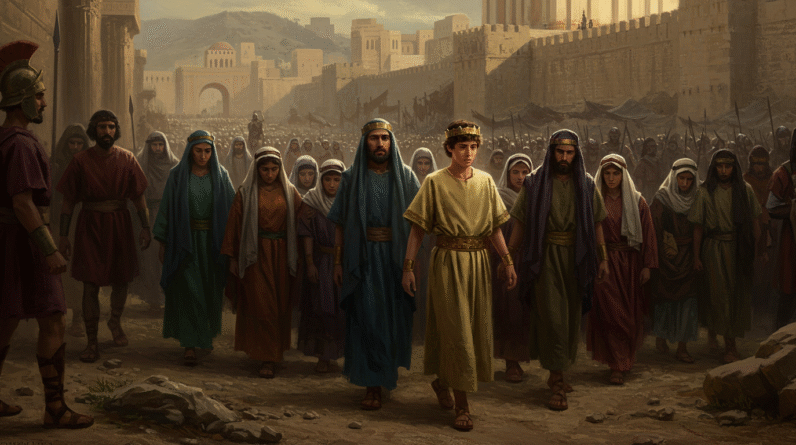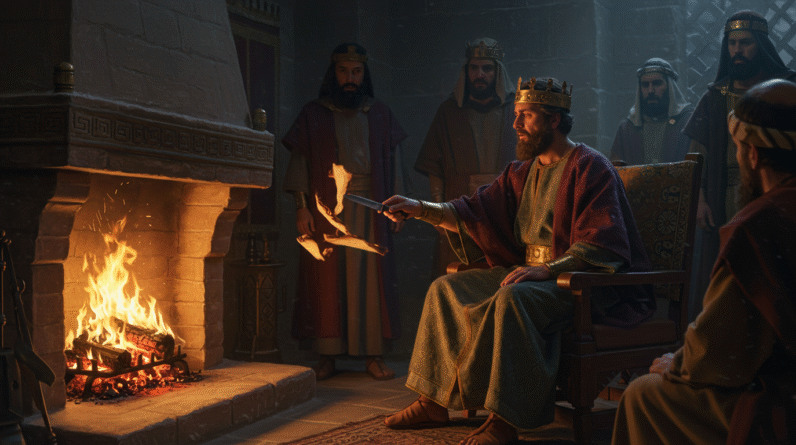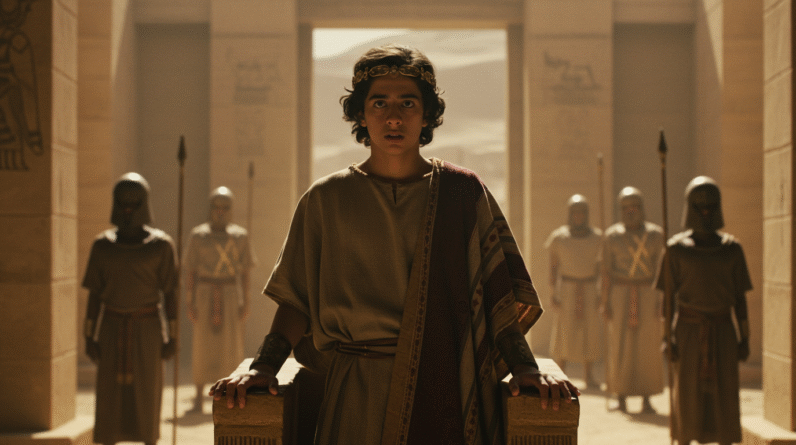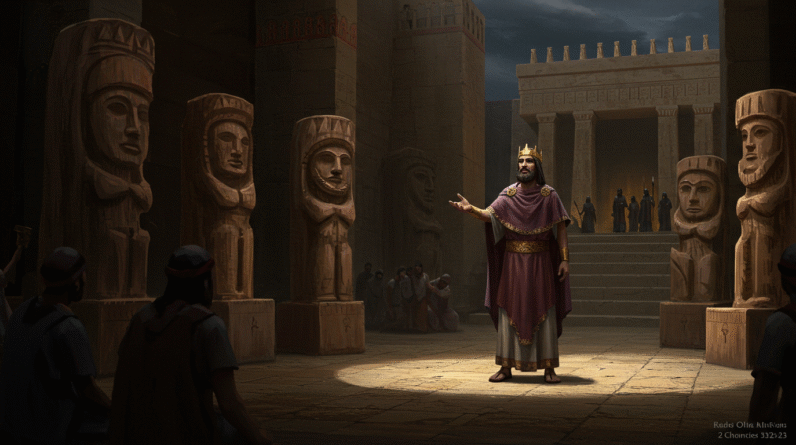Uzziah (Azariah): A Strong King Who Fell Into Pride (2 Chronicles 26:16)
You come to Uzziah’s story and you expect the usual arc of a king: a rise, a long midsection of competence, and a tidy moral at the end. What you find instead is something quieter and sharper — the slow folding of success into self, and the sudden severity of a boundary crossed. The Chronicler gives you a very particular picture: a king who began well, who prospered, who innovated, and who, in one moment, misread the line between power and prerogative. That moment is recorded with a single, blunt clause in the verse you keep returning to: 2 Chronicles 26:16. It is the hinge of the story.
Who was Uzziah (Azariah)?
You should know the basics first. Uzziah — called Azariah in other books — became king of Judah when he was sixteen, succeeding his father Amaziah, and reigned for fifty-two years. The record is short and efficient about the facts: he began young, and for a long time, he was successful. You can read the historical outline in the Chronicler’s account: 2 Chronicles 26:1. If you prefer a parallel summary, the book of Kings calls him Azariah and gives you the same overall arc of a long reign and a mixed legacy: 2 Kings 15:1-7.
The dual names sometimes unsettle you: Uzziah, which suggests strength, and Azariah, which suggests the Lord has helped. That double naming is the first of several small ironies in his narrative. There’s a sense in the Chronicler’s telling that Uzziah was, for a time, what his name promised: strong and helped. But names in biblical narratives are rarely mere labels; they’re shorthand for a trajectory. You start to sense how easily a name’s promise can become a prophecy of pride.
The start: faithfulness and favour
For many years, Uzziah seemed like a textbook example of faithfulness rewarded. In the Chronicler’s economy, the story hinges on a cause-and-effect claim: Uzziah “sought God during the days of Zechariah” and was given success (that phrasing appears in 2 Chronicles 26:5). You read that and you feel something human: the correlation between steady devotion and stability, the sense that discipline and attention pay off in visible ways.
The text doesn’t sentimentalize him. It notes that he did what was right in the eyes of the Lord, which reads as both description and moral ledger. For you, the moment invites a private question: when you are faithful — to relationships, to work, to some practice — do you expect visible recompense? Uzziah’s early success suggests that faithfulness and favour often travel together, but that proximity can become the source of a different hazard.
Achievements and ambition: building, military, and innovation
Uzziah’s reign is almost shockingly practical. The Chronicler lists his achievements with an engineer’s eye: he fortified cities, developed agriculture by cutting out cisterns, organized the army into units with officers and commanders, and even innovated in military technology — crafting engines and war machines, outfitting archers and shields. The catalogue of accomplishments is in 2 Chronicles 26:10-15, and it reads like a CV for a king who believed that infrastructure and military readiness were the bones of a secure realm.
There’s also an interesting domestic detail: his palaces, his stables, his vineyards — the ordinary accretion of prosperity. You notice that the Chronicler is not uninterested in material success; on the contrary, he lists these things as testimony to God’s blessing. That leaves you with an ambivalent feeling: the same list that proves divine favour also shows the scope of Uzziah’s power — and that power becomes a temptation, because it invites you to test limits.
The turning point: pride and the altar (2 Chronicles 26:16)
Then you come to the line that changes everything. The Chronicler writes, almost as if he’s trying to be economical with shame, that “when he had become strong, his heart was proud, to his destruction” — that is 2 Chronicles 26:16. The clause is short, but it lands like a stone. Pride is identified as the pivot from blessing to judgment. You can feel the familiar human logic: success breeds confidence, confidence softens the sense of dependence, and the softened sense of dependence slides into self-sufficiency.
What follows is an act of overreach. Uzziah enters the temple to burn incense on the altar — a role reserved for Aaron’s descendants, the priests. The Chronicler presents this as a transgression that is not merely procedural but theological. The altar, the incense, and the role all have delineations in the Law: worship has structure; certain duties are delegated. For that, the text points you to precedents and prescriptions: the specific liturgical role of priests is attested in passages like Exodus 30:7-8 and the sharp example of unauthorized offerings in Leviticus 10:1-3. You understand that the incident is not about a single ritual but about a category mistake: a king taking on priestly authority.
The priests, the prophet, and the immediate confrontation
It’s here that you meet Azariah the priest (not to be confused with Azariah the king’s alternate name). He’s one among eighty brave priests, and they confront the king. The Chronicler describes their courage simply: they stood up to the king and told him he had trespassed, and they warned him that the Lord would not honor such action (2 Chronicles 26:17-18). You see the scene, and you see what leadership looks like when it has accountability: a group that risks the king’s ire to tell the truth.
The interaction is awkward and immediate; there is no long debate. The text implies that Uzziah was angry, but his anger is interrupted when leprosy appears on his forehead. It’s a vivid narrative turn: the priestly counsel is not only moral but prophetic — their words are followed up by a sign that the community reads in grim terms. The so-called punishment is both literal and symbolic. The law’s most feared disease becomes the instrument by which a boundary is enforced. Read 2 Chronicles 26:19-21 and you find the story moving quickly from transgression to consequence to exile.
Leprosy, isolation, and the loss of office
The affordability of power is exposed in the aftermath. Uzziah is forced to live in a separate house, cut off from the temple and from normal social rituals, until the day of his death. The Chronicler notes with a certain clinical finality that his son Jotham governed the people in his place, because Uzziah was a leper and could not come into the temple (2 Chronicles 26:21). There is a kind of tragic dignity in that arrangement: he remains a king in title, but his functional authority — especially over religious things — is revoked.
You can’t help but think about what exile does to a person who defined himself as powerful. Isolation is a moral as well as physical consequence here. The Chronicler’s theological imagination reads the isolation as corrective: a way to insulate the community from an unauthorized sacramental disruption and also to separate the man who assumed divine prerogatives from the things of God. If you are honest with yourself, you see an echo in everyday life: when you overstep, institutions have ways of recalibrating you.

Law, ritual, and the limits of authority
One of the striking things about the episode is how it underscores the biblical insistence on boundaries and designated roles. The Torah places a theological premium on order — certain functions are assigned to particular people for a reason. The injunction that Aaron and his sons are to burn incense is in passages like Exodus 30:7-8. The story of Nadab and Abihu in Leviticus 10:1-3 shows the fatal consequences of unauthorized offerings. Here, Uzziah’s ambition is not punished for personal piety; it’s punished because it violates a covenantal, communal structure.
You might argue about whether a king could ever be a priest — the Bible isn’t always uniform about these boundaries. Some judges and kings perform religious acts, and David brings the ark to Jerusalem. But the Chronicler controls the narrative tightly: the problem is not the desire to worship, but the presumption of office. If you want a frame, think of it as a rule of role fidelity: when you step into someone else’s ordained duties, you risk doing violence to the community’s sacramental integrity.
Pride as a theological and psychological category
The story invites you to read pride both as a moral sin and as a psychological dynamic. Pride here is not merely arrogance; it’s the collapse of dependence into self-reliance. The Chronicler frames it as spiritual hubris, and the Bible elsewhere always seems anxious about that disease. Proverbs’ aphorism is sharp: “Pride goes before destruction, a haughty spirit before a fall” (Proverbs 16:18). The New Testament echoes the point with a blunt corrective: “God opposes the proud but shows favor to the humble” (James 4:6; see also 1 Peter 5:5).
For you, those verses are not abstract. They press on questions about your own rhythm: when did you start to believe your success was your doing? How do you notice the subtle shift from healthy confidence to a sense of entitlement? Uzziah’s story puts flesh on a proverb: it shows how a man’s achievements can incubate the sin they were meant to complicate.
The role of accountability and courageous speech
One of the most humanly compelling aspects of the account is the priests’ willingness to speak truth to power. They confront the king when he is in the act, and they do so at personal risk. You think about what courage means when you don’t have formal authority: it is saying what needs to be said anyway. The Chronicler seems to admire that courage; you can almost hear him approving the priests’ fidelity to order and law.
That moment is a template for healthy governance: institutions that protect the common good often rely on intermediaries who will enforce boundaries even when the person overstepping is loved or powerful. For you, this raises a practical question: who tells you hard truths? Who in your life is willing, like those priests, to risk friction to protect a broader integrity?
The human cost: isolation and mortality
Even after the dramatic moment of leprosy and exile, the narrative is not finished. Uzziah lives out his days in a kind of diminished kingship. The Chronicler records his death and burial: he died and was buried with his fathers in the field of the burial which belonged to the kings (2 Chronicles 26:23). It’s a sober ending — not stoning or execution, but a slow contractual consequence: you retain status, but you lose the intimacy and access that once defined your public role.
You notice in that endpoint a larger biblical theme: sin isolates, but it does not necessarily erase dignity. Uzziah is not demonized. He is remembered as strong and as a builder; the chronicler’s ink is not entirely dark. That ambivalence is important. The Bible rarely reduces characters to caricatures. Instead, it gives you a portrait that is generous in its realism: a man blessed and gifted, whose flaw is real and whose punishment is not gratuitous but proportionate and instructive.
Lessons for you from Uzziah’s story
The story is not only historical; it is didactic. It asks you to consider how success changes you, how you negotiate authority, and how you respond when someone speaks truth to your excesses. Here are a few practical takeaways, offered not as platitudes but as invitations to self-examination.
- Be attentive to how you narrate your achievements: do you speak of them as gifts, or do you come to speak of yourself as the sole source?
- Keep structures of accountability: seek people or institutions who will interrupt your ascent when you overreach.
- Respect the boundaries of roles: part of communal flourishing is the discipline of role fidelity, whether in church, home, or workplace.
- Cultivate humility not as self-abasement but as an orientation: humility keeps you connected to sources beyond your control.
You should understand that these aren’t moralistic bullet points; they are practical rhythms for communal life. The biblical imagination assumes interdependence; to forget that is to court a quiet moral plane of isolation.
Leadership, power, and the temptation to conflate office with identity
Leadership often feels like identity. Uzziah’s story shows how dangerous that identification can be. When you begin to measure your worth by the instruments of power — palaces, military units, public recognition — you risk basing identity on contingent things. The Chronicler wants you to see that power must be exercised within humility’s framework, and that the spiritual dangers of authority are unique: the more power you have, the harder it becomes to tolerate correction.
The story suggests that good leadership includes a capacity to accept limits. If you want a practical ethic, it’s to prefer structures that allow for redress; to cultivate humility as a leadership skill; and to imagine your role as stewardship rather than entitlement. Those are not novel ideas, but they matter because of how often you witness their absence.
Grace, repentance, and unfinished stories
There’s also room here for grace. The narrative does not end with the annihilation of Uzziah’s reputation. Despite his punishment, he is not forgotten or dismissed. He is remembered with his good deeds listed alongside his failures. For you, that offers a model of the shape of communal memory: neither whitewashing nor total condemnation, but a sober accounting.
You might ask whether Uzziah repented. The text doesn’t narrate an explicit public repentance, and you are left to infer. That indeterminacy is telling: sometimes the biblical record leaves room for the inner life. The law’s public consequences are clear; the inner turn is often opaque to the chronicler’s pen. Still, the story doesn’t deny God’s capacity for mercy. There is a theological tension: divine justice and the possibility of grace dwell together. It’s a tension you live with in your own life when consequences and forgiveness intersect.
Where to read the full account and the parallels
If you want to read the story straight through, the primary narrative is in the Chronicler’s account: 2 Chronicles 26:1-23. The parallel history in Kings frames him as Azariah and gives you a conspectus of the same reign: 2 Kings 15:1-7. For the legal background on priestly duties, compare the ritual prescriptions in Exodus 30:7-8 and the cautionary example in Leviticus 10:1-3. The broader biblical reflections on pride and humility can be read in Proverbs 16:18 and James 4:6.
Those links let you trace the intertextual network the Chronicler expects you to know: a law, a cautionary tale, and a moral aphorism that together form a compressed pedagogy on authority and limitation.

Final reflections: living with limits and loving the truth
When you leave Uzziah’s story and go back into your day, you take with you the image of a man whose competence was real and whose blind spot was pride. The story stops you from romanticizing power or simplifying success into moral merit. Instead, it invites a posture: you can pursue excellence and innovation without presuming divine prerogative; you can accept honor without letting it remake you into a self-justifying idol.
The priests’ courage and the law’s boundary stand as reminders that communities need fidelity to forms and to truth. Your life requires that same fidelity: to practice, to role, and to the people who will name you when you’re wrong. Uzziah’s ending is sober but not final — a human life assessed in its fullness, with both its gifts and its failures held in view.
If you read Scripture for instruction, this story teaches you that success demands a vigilance of the soul. If you read it as narrative, it gives you a human portrait: a person who rose, who enjoyed God’s favor, who overstepped, and who suffered the consequences he probably didn’t anticipate. That is a story you see repeated in different forms in your own life and in public life: the conflation of role and self, and the cost of crossing sacred boundaries.
If you want to dwell longer with the text, follow the links above and read the account for yourself. The Chronicler’s voice is concise but precise; the law’s voice is severe but protective. Between them, you find a moral grammar for how authority should be exercised and checked.
Explore More
For further reading and encouragement, check out these posts:
👉 7 Bible Verses About Faith in Hard Times
👉 Job’s Faith: What We Can Learn From His Trials
👉 How To Trust God When Everything Falls Apart
👉 Why God Allows Suffering – A Biblical Perspective
👉 Faith Over Fear: How To Stand Strong In Uncertain Seasons
👉 How To Encourage Someone Struggling With Their Faith
👉 5 Prayers for Strength When You’re Feeling Weak

📘 Jesus and the Woman Caught in Adultery – Grace and Mercy Over Judgement
A powerful retelling of John 8:1-11. This book brings to life the depth of forgiveness, mercy, and God’s unwavering love.
👉 Check it now on Amazon
As a ClickBank Affiliate, I earn from qualifying purchases.
Acknowledgment: All Bible verses referenced in this article were accessed via Bible Gateway (or Bible Hub).
“Want to explore more? Check out our latest post on Why Jesus? and discover the life-changing truth of the Gospel!”








